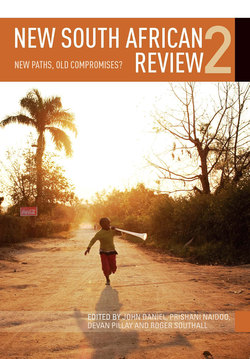Читать книгу New South African Review 2 - Paul Hoffman - Страница 24
На сайте Литреса книга снята с продажи.
CONCLUSION
ОглавлениеIs this the same dance as always – fierce quarrels between the battered wife (Cosatu) and abusive husband (the ANC) only to be followed by reconciliation before the next flare-up? Can the battered wife ever leave her husband, despite neglect and abuse, as long as he periodically gives her flowers and a few trinkets? Does she dare blink at the new suitors in civil society, urging her to seek a divorce and ride into the sunset with them? What role does the SACP play in this ménage a trois? Is it the older first wife, deeply bonded to the marriage and, despite abuses from time to time, still intent on placating the ANC (and convincing the younger bride that things will get better)?
Whatever view is adopted, recent research among Cosatu members underlines the continued, if declining, popularity of the ANC and the alliance and this seems to reinforce the view that the ANC knows that its partners will continue to line up behind it. However, the argument that this is due to the politics of patronage (Buhlungu, 2010), seems only partially true. Community uprisings involving marginalised, often unemployed residents against ANC councillors and the lack of ‘service delivery’ also do not seem, ultimately, to question the ANC’s legitimacy.
The ANC Alliance has a long history, which is cemented by a powerful NDR ideological discourse that secures its legitimacy among the working class. This has given the ANC, like many other liberation movements, almost mythical (and mystical) status akin to that of a religious authority. It is therefore no surprise that ANC president Jacob Zuma once said that the ANC will rule ‘until Jesus comes back’ (Mkhwanazi, 2008). In some senses, for many South Africans, the ANC itself can do no wrong – only its leaders can fail the movement.
Unless liberation movements address challenges of underdevelopment, they often start to lose their legitimacy after about twenty years in power, as the cases of India and Zimbabwe illustrate. The Institutional Revolutionary Party in Mexico, however, absorbed the labour movement, and ruled (through corruption and authoritarian practices) for most of the twentieth century. In a different context, the Swedish Labour Party, in close alliance with the labour movement, ruled for most of the twentieth century through free and fair elections – but built a powerful welfare system that has given the working class a ‘middle class’ lifestyle.
In South Africa there are no signs that the ANC’s mystical status as the party of liberation is under immediate threat. Despite some ominous authoritarian tendencies, the movement remains remarkably transparent and internally democratic compared to other liberation movements, allowing dissent from below – whether from the youth or organised workers – to continuously pose a threat to elite aspirations. Indeed, ANC veteran Ben Turok feels that the ANC’s 2010 National General Council was the ‘most democratic’ he had ever attended (2010b). As long as this continues, challenges from the left outside the alliance are likely to remain isolated and parochial.
Although the Alliance will remain in place for as long as the state can manage to appease the aspirations of the working class with relatively protective labour legislation and social grants, ANC support among the broader working class is slowly declining, as is shown by recent surveys as well as election results. Moeletsi Mbeki (Business Day, 21 February 2011) is correct to warn that, as long as South Africa remains beholden to the minerals-energy complex (and, I would add, the financial sector) and does not develop secondary industries on a sustainable basis, the point will come when it will be unable to generate sufficient revenue from mining and related industries to provide social grants. At that point the social crisis will deepen. Not only might the alliance fall apart – the country could experience its Tunisian/Egyptian moment.
Attempts to build a left pole of attraction outside the alliance are, consequently, unlikely to have much impact on the political landscape in the near future. However, there is a role for independent socialists to define, in theory and in practice, a more imaginative, more participatory-democratic and ‘eco-socialist’ alternative. Unless the alliance adapts, and steals its thunder, in the longer term its time might come.
